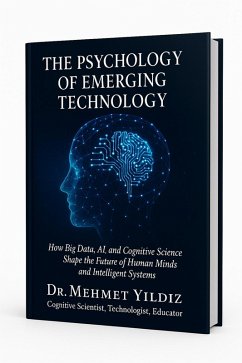The recent White House AI Action Plan, with a surge of initiatives in developed nations, signals a new era where artificial intelligence and quantum computing are no longer ambitions but core pillars of national strategy. This race for technological dominance is not merely a contest of innovation; it is a defining force that will shape economies, governance, cognition, and the ethical boundaries of our future. Witnessing this moment compelled me to expand my long-developed manuscript on the psychology of technology into a book, one designed to offer scholars, practitioners, and the public a coherent framework for understanding and influencing these profound transformations. For over four decades, I have worked at the intersection of cognitive science, neuroscience, technology, and psychology as a researcher, educator, and emerging technology leader in global enterprises. I have witnessed firsthand how emerging technologies both expand and challenge the way we think, decide, learn, and live.
The Psychology of Emerging Technology is the culmination of this lifelong work. It defines and fills a critical gap in an emerging discipline: understanding how rapidly evolving tools, from Big Data and IoT to AI, cloud ecosystems, virtual reality, and wearable technology, reshape cognition, behavior, and mental well-being at individual, organizational, and societal levels. Grounded in real-world leadership experience and academic research, I have written this book for PhD students, researchers, policymakers, technologists, enterprise leaders, and critical thinkers who seek more than surface-level commentary. Through case studies, cognitive models, and tested frameworks, it blends the precision of science with the insight of lived practice. At its core is my MINDTECH™ framework, which stands for
Mapping Innovation, Integrating Neuroscience, Navigating Data, Designing Technology, Testing Ethics, Empowering Cognition, Cultivating Humanity, and Harnessing Futures. This original framework unites technical imperatives with cognitive and ethical outcomes, making it as relevant to AI architects as it is to educators, policy experts, and superlearners. Supporting MINDTECH™ are two additional frameworks:
- S.P.A.R.K.S.™: Scalable, Predictive, Adaptive, Resilient, Knowledge-Driven, Secure. Links each technical requirement to measurable business and societal outcomes, ensuring solutions are robust, flexible, and trustworthy.
- S.E.E. Model: Signal, Experience, Ethics. Guides technology assessment for the AI era, ensuring accurate signal interpretation, meaningful human experience, and responsible governance.
The Pillar Framework structures the book into four parts: Concepts, Systems, People & Practice, and Applications & Futures, while the SMART MIND Loop™ integrates cognitive optimization strategies, ensuring ideas are understood, retained, and applied. You will explore:
- How social media rewires attention and emotional processing.
- Why immersive VR and digital therapeutics can both heal and harm.
- How AI systems influence trust in human-machine collaboration.
- The risks of algorithmic bias, privacy erosion, and inequitable access, and how to address them through design and governance.
- And it will include more topics in the psychology of technology domain.
Every chapter closes with actionable insights and reflection questions to bridge knowledge and application. My aim is not only to explain how technology shapes the mind, but to equip you with tools to design, implement, and govern systems responsibly. This is a book for those who want to lead with technical excellence, ethical responsibility, and cognitive wisdom, a guide.
Dieser Download kann aus rechtlichen Gründen nur mit Rechnungsadresse in A, B, CY, CZ, D, DK, EW, E, FIN, F, GR, H, IRL, I, LT, L, LR, M, NL, PL, P, R, S, SLO, SK ausgeliefert werden.









